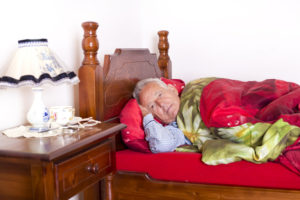April 12, 2017
 For people providing care for a family member with Alzheimer’s, as the day comes to a close, the caregiving stress can intensify. Sundown syndrome (or sundowning), a common experience in dementia in which seniors become agitated, fearful, and restless during the evening hours, is exhausting for all involved. Concerns increase as family members try to help keep the elderly adult calm and safe, while attempting to get some rest themselves.
For people providing care for a family member with Alzheimer’s, as the day comes to a close, the caregiving stress can intensify. Sundown syndrome (or sundowning), a common experience in dementia in which seniors become agitated, fearful, and restless during the evening hours, is exhausting for all involved. Concerns increase as family members try to help keep the elderly adult calm and safe, while attempting to get some rest themselves.
One special program provides a solution: overnight care that caters specifically to individuals with sundowning issues. Described as a slumber party setting, aging adults get involved in a complete variety of structured activities in a protected atmosphere: music and dancing, puzzles, movies, meal preparation, and more – delivering family care providers a much appreciated opportunity to rest themselves. “Many family members want to care for relatives with Alzheimer’s at home, but in order to do that, the caregivers themselves have to remain healthy. You cannot stay healthy if you don’t get a good night’s sleep,” explains Ruth Drew of the Alzheimer’s Association.
There are certain steps one can take to try and restore a healthier sleep pattern for seniors with Alzheimer’s disease.
- Make sure the senior is exercising daily (early in the day)
- Be sure to let the person have exposure to morning sunlight.
- Have a set routine for meals, bedtime and wake-up time.
- Maintain a comfortable temperature in the bedroom and use a softly lit nightlight.
- Have the senior avoid nicotine, caffeine and alcohol.
- When the senior becomes restless or is unable to sleep, have him or her get out of bed, leaving the bed for sleeping only.
- Find calming, quiet activities to do together during wakeful times, but avoid watching television.
There are a number of different medications that the doctor may prescribe if the alternative methods are no longer working, such as:
- Tricyclic antidepressants
- Particular antipsychotics (noting that some antipsychotics are linked with a rise of stroke and even death in those with dementia – so proceed with caution)
- Medications to aide in falling and staying asleep
- Benzodiazepines
Make sure to go over the risks vs. benefits of any treatment option suggested by the senior’s doctor. And remember that a treatment plan that works now may not be as effective as the condition progresses – and vice versa.
Continuum can also assist with overnight caregivers in the home to help restore peace to evening hours, particularly beneficial for seniors struggling with sundown syndrome. Contact us to learn more.
